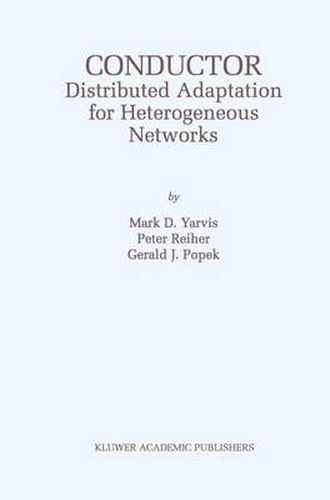Conductor: Distributed Adaptation for Heterogeneous Networks
Mark D. Yarvis,Peter Reiher,Gerald J. Popek

Conductor: Distributed Adaptation for Heterogeneous Networks
Mark D. Yarvis,Peter Reiher,Gerald J. Popek
This title is printed to order. This book may have been self-published. If so, we cannot guarantee the quality of the content. In the main most books will have gone through the editing process however some may not. We therefore suggest that you be aware of this before ordering this book. If in doubt check either the author or publisher’s details as we are unable to accept any returns unless they are faulty. Please contact us if you have any questions.
Internet heterogeneity provides a challenge for application development: adaptive software. Together with the increased Internet capacity and new access technologies, network congestion and the use of older technologies, wireless access, and peer-to-peer networking are increasing the heterogeneity of the Internet. Applications should provide gracefully degraded levels of service when network conditions are poor, and enhanced services when network conditions exceed expectations. Existing adaptive technologies, which are primarily end-to-end or proxy-based and often focus on a single deficient link, can perform poorly in heterogeneous networks. Instead, heterogeneous networks frequently require multiple, co-ordinated, and distributed remedial actions. This text describes an approach to graceful degradation in the face of network heterogeneity - distributed adaptation - in which adaptive code is deployed at multiple points within a network. The feasibility of this approach is demonstrated by conductor, a middleware framework that enables distributed adaptation of connection-oriented, application-level protocols. By adapting protocols, conductor provides application-transparent adaptation, supporting both existing applications and applications designed with adaptation in mind. The book introduces techniques that enable distributed adaptation, making it automatic, reliable, and secure. In particular, it introduces the notion of semantic segmentation, which maintains exactly-once delivery of the semantic elements of a data stream while allowing the stream to be arbitrarily adapted in transit. It also introduces a secure architecture for automatic adaptor selection, protecting user data from unauthorized adaptation. These techniques are described both in the context of conductor and in the broader context of distributed systems. Finally, this book presents empirical evidence from several case studies indicating that distributed adaptation can allow applications to degrade gracefully in heterogeneous networks, providing a higher quality of service to users than other adaptive techniques. Further, experimental results indicate that the proposed techniques can be employed without excessive cost.
This item is not currently in-stock. It can be ordered online and is expected to ship in 7-14 days
Our stock data is updated periodically, and availability may change throughout the day for in-demand items. Please call the relevant shop for the most current stock information. Prices are subject to change without notice.
Sign in or become a Readings Member to add this title to a wishlist.


